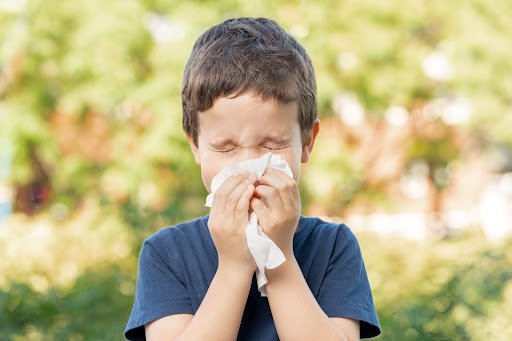The 411 On Allergies In Children
April 30, 2024

Allergies can be a common and sometimes challenging aspect of childhood. As a parent, understanding the basics of allergies in children is crucial for recognizing symptoms, managing reactions, and ensuring the well-being of your little ones. From common triggers to preventive measures, Holly Springs Pediatrics is here with a comprehensive guide on allergies in children.
Understanding Allergies
Allergies occur when the immune system reacts excessively to substances that are generally harmless. In children, common allergens include pollen, dust mites, pet dander, certain foods (such as peanuts, milk, eggs, and shellfish), insect stings, and certain medications.
Recognizing Symptoms
Allergic reactions can manifest in various ways, and symptoms may range from mild to severe. Common symptoms include sneezing, runny nose, itchy or watery eyes, skin rashes, hives, coughing, wheezing, and gastrointestinal issues. In severe cases, allergies in children can lead to anaphylaxis, which is a life-threatening reaction requiring immediate medical attention.
Common Childhood Allergies
While dealing with allergies in children, there is a wide range of substances to consider, with some allergies being more prevalent in childhood. Food allergies, especially to peanuts, tree nuts, milk, eggs, soy, wheat, and fish, are common. Environmental allergies to pollen, mold, dust mites, and pet dander are also frequent in children.
Diagnosis and Testing
If you suspect your child has allergies, consult a healthcare professional. Allergy testing may include skin tests, blood tests, or a combination of both. These tests help identify specific allergens triggering your child’s reactions, allowing for targeted management strategies.
Allergy Management
Once allergies are diagnosed, effective management is crucial to minimize symptoms and enhance your child’s quality of life. This may involve allergen avoidance, medication, and lifestyle adjustments. Allergies in children may prompt you to allergen-proof your home by using air purifiers, washing bedding regularly, and maintaining a clean environment can help reduce exposure.
Medications
Depending on the severity of symptoms, your child’s healthcare provider may recommend over-the-counter or prescription medications. Antihistamines can alleviate itching and sneezing, while nasal sprays or asthma medications may be prescribed for respiratory symptoms. In cases of severe allergic reactions, an epinephrine auto-injector (EpiPen) may be prescribed for emergency use.
Allergy and Asthma Connection
Allergies and asthma often go hand in hand in children. Allergic reactions can trigger or exacerbate asthma symptoms. Managing both conditions is essential for comprehensive care. Long-term control medications may be prescribed to manage asthma symptoms and prevent exacerbations.
Anaphylaxis Preparedness
For children with severe allergies, particularly to foods or insect stings, anaphylaxis is a constant concern. Parents and caregivers must be prepared with an emergency action plan, including the use of an EpiPen. Training on how to administer the injection is crucial for quick and effective response in emergency situations.
Allergies and Diet
In cases of food allergies in children, dietary adjustments are necessary. Reading food labels diligently, communicating with schools and caregivers, and being vigilant about potential cross-contamination are crucial steps. Working closely with a pediatric allergist or dietitian can help ensure your child receives adequate nutrition while managing food allergies.
Allergy Education
Educating your child about their allergies is empowering and promotes responsible self-care. Teach them to recognize their allergens, understand their medications, and communicate effectively about their condition with teachers, friends, and caregivers. As they grow older, instilling a sense of responsibility regarding their allergies will help them navigate various environments safely.
Regular Follow-Ups
Regular follow-up appointments are essential for monitoring allergies in children and adjusting management strategies as needed. Periodic testing may be recommended to assess changes in allergen sensitivities and guide treatment plans.
With proper care and attention, children with allergies can lead active, healthy lives and participate fully in the joys of childhood. Holly Springs Pediatrics is committed to providing quality care to your kids at all times on a wide array of subjects. For more information on allergies in children or to get in contact with our office, call (919) 249-4700 to schedule an appointment.
